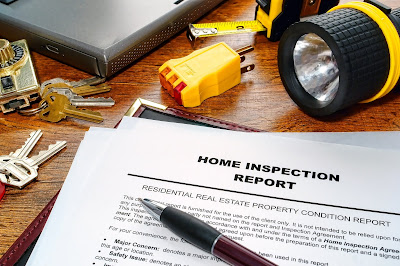

Buying Real Estate Investments - Part 5 of 6 - The Offer & Post Offer
Moving on to step 5 of Buying Real Estate Investments with the offer and what happens after your offer is accepted. You found the right property...You made the offer! Once it gets accepted there are many things that take place before closing. So let's first examine the most important thing you need to ask yourself in this step: How Do I Make An Offer?

And what I mean by that is making an offer that is realistic..and justified. I realize we're all looking for a great deal, but don't be tempted to make an offer that is significantly lower than asking price. That can spell disaster and get you benched. And remember, just because you make an initial offer, it doesn't mean that's the only offer you can ever make. The seller might even counteroffer which keeps the negotiation moving. But if you make a low-ball offer, they may be so insulted that they ghost you. So don't let that happen.

This is a subject I know all too well. Once I closed with a Pittsburgh, PA client who finally got a lovely property...after the 4th try! We missed a couple great deals by doing just that--lowballing--trying to "steal a deal".
Yes, they're happy now, but it took a year and a lot of sorrowful days after the offers were flatly rejected. They learned the hard way. So If you want it, bid fairly!
First bids, like first impressions, are crucial to keep all parties in the game. So with that in mind, how does one determine what would be a solid offer? Not easy, so feel free to reach out to your Realtor, Wholesaler, Property Manager or other real estate advocate as that's where you can get some great advice. Look at things such as comparables, but make sure they are truly similar. Find out how long the property has been on the market, its sales history, the motivation of the seller in addition to a host of other variables. What you want first and foremost is engagement. So get the seller in the game and keep them interested. I often suggest writing a personal letter to the seller stating why you love that property. Real estate is a very engaging business that is often influenced by a personal match of buyers to sellers. While your real estate advocate cannot say "here's what's been offered (as they are legally not told that) and here's what you should offer", they can advise you so you can make a strong and most knowledgeable offer. That works for both buyers of homes and investment properties. I learned many many years ago in sales: People Buy from People! So making it somewhat personal can go a a long way to winning.

Yes, writing a letter actually works. A couple of years ago my client was looking at property, part of an estate, which was represented by children of the deceased. They grew up in that house and continued to love it. Our letter showed them how much the couple wanted to raise their family there.
And when the multiple offers were compared, guess who won out?!
Ok, so you may think that works just for home buyers, but personally I have always included a "personal touch" to all offers submitted for clients, both as home buyers and investment property buyers. As I said before, People buy from People.

Your offer may be accepted...rejected ...or countered. The goal is to bring buyer and seller together, generally somewhere in the middle. Any successful deal allows both parties to feel they won. Again, here's where consulting your realtor or other real estate professional, with experience, can help. It's not their "first time at the rodeo", they do this daily, so allow them to help. If there are multiple offers, a seller will compare and choose the strongest. There are many variables to a seller's decision and there is no playbook or crystal ball to tell what they will accept. But the stronger the offer the better. Most often cash is king, but not always. Still though there are levels of enticement to offers. So make it a good one and you just may bid it to win it!!

Hooray! Your offer is accepted! You're on your way towards settlement (aka closing), but there's still a lot of work to do, so what comes next? Once the agreement is signed, it defines the terms under which the transaction will complete. So unless you are paying by cash, go ahead and apply for your mortgage. Also at this time you will need hand (earnest) money, typically about 1% of the purchase offer price. The earnest money is deposited into an escrow account which is held by a real estate brokerage or settlement company, which may vary by state. This money is a commitment on your part. Your real estate advocate will explain how the earnest money is handled during the transaction. Assuming you have selected an inspection contingency (or other contingencies) those will need to be scheduled and completed.

So let's talk a little bit about the inspection. First off should you choose to have one done, you will most likely pay for it. Who you choose to perform it is solely your decision but you definitely want someone who is certified. An inspection determines the present condition of the property's major systems based upon a visual and functional review, plus it's overall condition. The goal here is to identify things that may be deficient or potentially unsafe. An inspection is not a guarantee that things won't break in the future, but it acts as an independent, professional opinion towards the condition of the property. Bottom line: Your inspector will identify current issues and recommend items to watch in the future. It is HIGHLY recommended that, for your protection, you get a property inspection! Plus the results could either give you the option out or leverage in further negotiations.

Then there's the appraisal (Yep, you'll most likely pay for it). Consider the appraisal as a process that has two goals: protecting you for the true value versus your sales price, and ensuring the lender has sufficient collateral to lend against. If an appraisal comes in lower than what the sales price is, this presents new challenges to the mortgage process. Best case scenario is that the property appraises and the transaction moves forward towards closing! (Now of course, if you are an all cash buyer, an appraisal becomes an option but not a requirement).

Ok, so the property has appraised and the inspection results resolved. What's next? Your real estate advocate will guide you through connecting with an attorney and/or settlement company that will manage the remaining steps in order to prepare you and the seller for settlement. Now if you're closing on a home for yourself, get packing. If this is an investment property, get your team ready for your new acquisition.
In the next and final step of my series, I will explain the process of closing. What happens a couple of weeks prior to, a couple of days prior to, and what you will need to bring to closing. We are almost there folks, so thanks for tuning in!




Comments